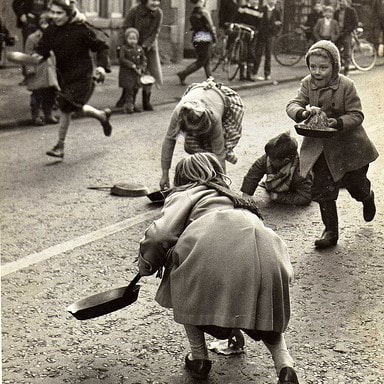Christians celebrate Shrove Tuesday just before Lent, which takes place on a different day each year, leading up to Easter.
Shrove is the past tense of shrive, which means to confess. In the Middle Ages, this day was a time for people to confess their sins and ask forgiveness. This allowed Christians to enter the Lent season and prepare for Easter with a clean spirit.
Also known as Pancake Tuesday it was a day for using up food that could not be eaten during Lent, which was a time for fasting. Therefore people made pancakes using leftover eggs and butter.
The pancake has a long history and is featured in cookery books as far back as 1439. The tradition of tossing or flipping them is almost as old: “And every man and maide doe take their turne, And tosse their Pancakes up for feare they burne.” (Pasquil’s Palin, 1619).
The ingredients for pancakes can be seen to symbolize four points of significance at this time of year:
Eggs ~ Creation
Flour ~ The staff of life
Salt ~ Wholesomeness
Milk ~ Purity
Pancake Racing
If eating pancakes wasn’t enough, it is also a sport. Pancake racing has been held in villages across the UK since the 15th century. Apparently, the tradition was started when a woman in Buckinghamshire was so rushed to confess her sins while making pancakes that she took her pan to church. On Shrove Tuesday every year the ladies of Olney, Buckinghamshire compete in the world-famous Pancake Race, an Olney tradition that dates back to 1445.
Pancake Recipes
Whatever the recipe, there are a few tricks to making a really good pancake batter – add the liquid to the flour slowly to keep the batter nice and smooth; always rest the batter for twenty minutes before you use it to allow the starches to swell, and always let the pan come back to a good temperature in between pancakes.
